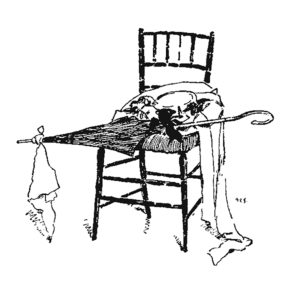I have just returned from forty-eight hours’ attendance at a bedside. My patient was a gentleman of forty who for eight years has habitually taken opium. He first learned its seductions, as happens with most opium-eaters, through a medical prescription. An inflamed cornea was treated with caustic applications and the pain assuaged with opium. He had never previously been addicted to the drug. There are certain men to whom opium is as fire to tow, and my friend was one of these. On the first of October he took a trifling dose; by the first of November he was taking, without increased sensation, an ounce of opium daily.
When by the physician’s orders he abandoned it, his symptoms were uneasy rather than distressing. But he had not forgotten the sweet dissolving views at midnight, the great achievements at noonday, the heavenly sense of a self-reliance which dare go anywhere, say anything, attempt anything. He had not forgotten the nonchalance under slight, the serenity in pain, the apathy to sorrow, which for one month set him calm in the temple-splendors of his darkened room. He had tasted as many earthly pleasures as any man I ever knew; but the ecstasies of form and color, wine, Eros, music, all the luxuries wealth could purchase, were nothing to him in comparison with the memory of that time. Accordingly, he had resort to opium whenever the world went wrong with him. No fateful contingency could pursue him inside opium’s enchanted circle. Such a man is a proper subject, not for reproof, but for medical treatment. When this truth is widely understood, some progress may be made in staying the frightful ravages of opium.
He decided to emancipate himself because opium-eating was a horrible bondage. Its spiritual thralldom was his hourly misery. He was haunted by pictures whose feverish beauty he had seen through a hundred times. In his dreams he had seen his ships on the sea; commerce in his warehouse; money in his bank; babies on his knee; a wife at his breast; a country estate with emerald lawns sloping down to the amber river or the leek-green sea. How pleasurably he had once perceived these possible joys! How undeludedly he now saw their impossible execution!

I spent two nights with him. For ninety days he had been going without opium, during which he had known nothing like proper sleep. I desire to be understood with mathematical literalness. There had been periods when he had been semiconscious; when the outline of things in his room grew vaguer and for five minutes he had a sensation of not knowing where he was. But that which appeared to be sleep was to him a stupendous succession of horrors which confusedly succeeded one another for apparent eternities, and ended with some nameless catastrophe of woe or wickedness, in a waking more fearful than the state volcanically ruptured by it.
From the hour he first refused his craving, and went to the battlefield of bed, he had endured such agony as no man but the opium-eater has ever known. The totality of the experience is an anguish which even Thomas De Quincey has but feebly painted: an anguish which slays the will, yet leaves the soul conscious of its murder; which utterly blots out hope; which brings every failure and inconsistency, every misfortune or sin of a man’s life, as clearly before his face as on the day he was first mortified by it—before his face, not in one terrible dream, which is over with sunrise, but as haunting ghosts, made out by the eyes of the soul down to the minutest detail, and never leaving the rack on which he lies for a moment of dark or daylight, till sleep, at the end of a month, first drops out of heaven on his agony.
When the most powerful alleviative known to science has bestowed the last Judas kiss, what shall soothe such doom? My friend will have to take opium all his life. Further struggle is suicide. He will have to continue the habit which kills him because abandoning it kills him sooner. All his dreams of liberty must be relegated to the world to come. Over the opium-eater’s coffin at least—thank God!—a wife and a sister can stop weeping and say, “He’s free.”
From “What Shall They Do To Be Saved?,” which appeared in the August 1867 issue of Harper’s Magazine.



















































































































































